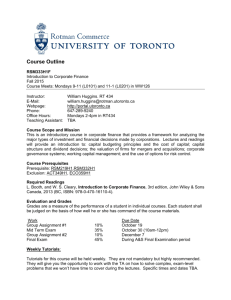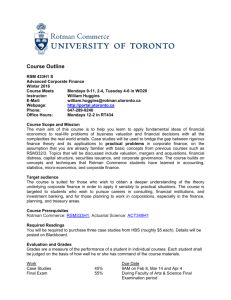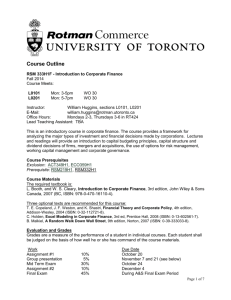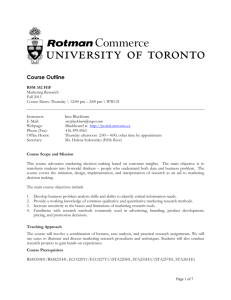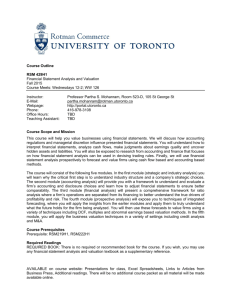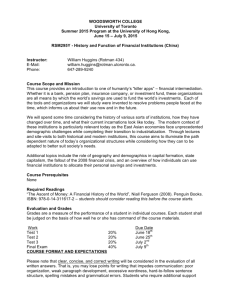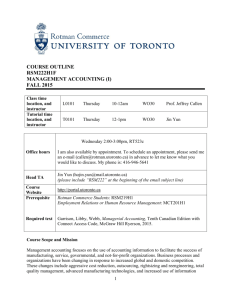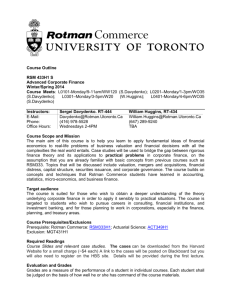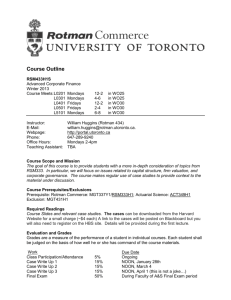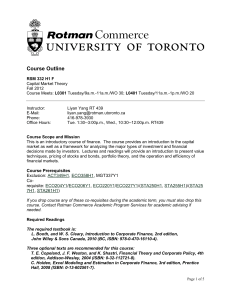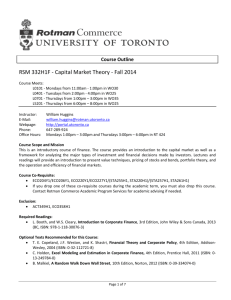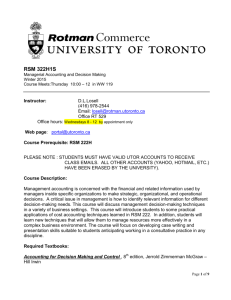Course Outline - University of Toronto
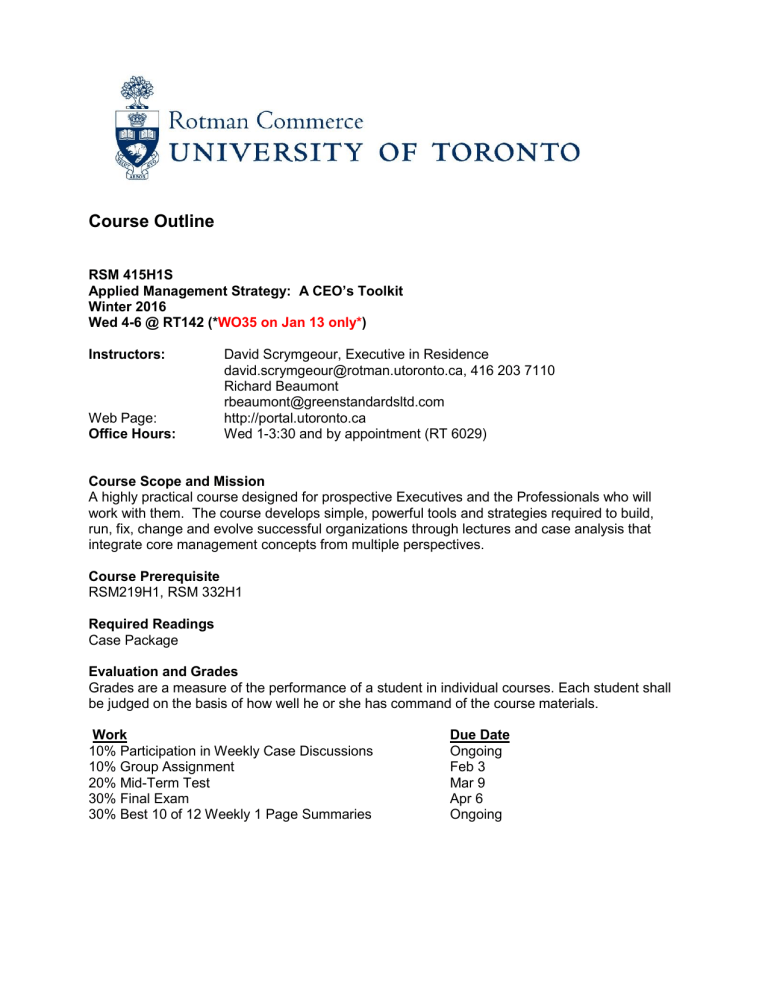
Course Outline
RSM 415H1S
Applied Management Strategy: A CEO’s Toolkit
Winter 2016
Wed 4-6 @ RT142 (* WO35 on Jan 13 only* )
Instructors: David Scrymgeour, Executive in Residence
Web Page:
Office Hours: david.scrymgeour@rotman.utoronto.ca, 416 203 7110
Richard Beaumont rbeaumont@greenstandardsltd.com http://portal.utoronto.ca
Wed 1-3:30 and by appointment (RT 6029)
Course Scope and Mission
A highly practical course designed for prospective Executives and the Professionals who will work with them. The course develops simple, powerful tools and strategies required to build, run, fix, change and evolve successful organizations through lectures and case analysis that integrate core management concepts from multiple perspectives.
Course Prerequisite
RSM219H1, RSM 332H1
Required Readings
Case Package
Evaluation and Grades
Grades are a measure of the performance of a student in individual courses. Each student shall be judged on the basis of how well he or she has command of the course materials.
Work
10% Participation in Weekly Case Discussions
Due Date
Ongoing
10% Group Assignment
20% Mid-Term Test
30% Final Exam
30% Best 10 of 12 Weekly 1 Page Summaries
Feb 3
Mar 9
Apr 6
Ongoing
Weekly Schedule
Session Date Topic
1 Jan 13 Course Overview
2 Jan 20 Sales Pillar
3 Jan 27 Finance Pillar
4 Feb 3 Operations Pillar
Group Assignment
5 Feb 10 Tool - Sales Tracker
Readings / Cases
3 Pillars, 3 Tools, 3 Resources
Case: Sofame Technologies
Case: Trader Joe's
Case: Battlefield Furniture Group
6 Feb 24 Tool - Cashflow Projection Case: Montfort Dairy
7 Mar 2 Tool - Career Map Case: Protegra
8 Mar 9 Mid-Term Test
9 Mar 16 Time Management
10 Mar 23 Money Management
11 Mar 30 People Management
Course Review
12 Apr 6 Final Exam
Case: The Dabbawala System: On-Time, Every Time
Case: Hanson Ski Products
Case: Kauflauf
COURSE FORMAT AND EXPECTATIONS
Team Work:
Learning to work together in teams is an important aspect of your education and preparation for your future careers. That said, project-based teamwork is often new to students; to work well in teams, it helps to follow a set of core expectations to best succeed at your team projects.
1. Read the document entitled, “Working in Teams: Guidelines for Rotman Commerce Students” which is available on the RC portal under the Academic Services tab.
2. When working in a team, Rotman Commerce students are expected to:
Treat other members with courtesy and respect;
Honour the ground rules established by the team;
Contribute substantially and proportionally to the final project;
Ensure enough familiarity with the entire contents of the group project/assignment so as to be able to sign off on it as original work;
Meet the project timeline as established by the team.
3. Resolving conflicts:
Conflicts are part of th e team’s process of learning how to work together. When handled well, it can generate creativity and bring-multiple perspectives to the solution.
Student teams are expected to work through their misunderstandings as soon as they arise (and prior to submission of the final project). When teams are unable to arrive at a solution that works for all members, the team must meet with the Rotman Commerce Team Coach** as soon as possible. The Coach will listen to the team and help develop options for improving the team process. All members of the project team must commit to, and, utilize their action plans.
** For an appointment with a Rotman Commerce Team Coach, please contact Elaine
Zapotoczny at elaine@nikoletaandassociates.com
. Elaine is highly skilled at facilitating team dynamics and collaboration. Note that the Team Coach’s role is to provide guidance, support and advice on team matters – not to formally evaluate or assess teamwork for academic purposes.
POLICY AND PROCEDURE
Missed Tests and Assignments (including midterm examinations)
Students who miss a test or assignment for reasons entirely beyond their control (e.g. illness) may submit a request to schedule a make-up. Provided that notification and documentation are provided in a timely manner, and that the request is subsequently approved, no academic penalty will be applied.
In such cases, students must notify Rotman Commerce on the date of the missed test (or due date in the case of course work) and submit supporting documentation (e.g. Verification of
Student Illness or Injury form ) to the Rotman Commerce Program Office within 48 hours of the originally scheduled test or due date. Students who do not provide Rotman Commerce or the instructor with appropriate or sufficient supporting documentation will be given a grade of 0
(zero) for the missed test or course deliverable.
Note that the physician’s report must establish that the patient was examined and diagnosed at the time of illness, not after the fact. Rotman Commerce will not accept a statement that merely confirms a report of illness made by the student and documented by the physician.
In case you miss the midterm examination for legitimate reasons, a make-up exam will be given.
Late Assignments
Students who, for reasons beyond their control, are unable to submit an assignment by its deadline must obtain approval from the instructor for an extension. Supporting documentation will be required as per the policy on missed tests and assignments.
Accessibility Needs
The University of Toronto is committed to accessibility. If you require accommodations for a disability, or have any accessibility concerns about the course, the classroom or course materials, please contact Accessibility Services as soon as possible: accessibility.services@utoronto.ca
or http://www.accessibility.utoronto.ca/ .
Academic Integrity
Academic Integrity is a fundamental value essential to the pursuit of learning and scholarships at the University of Toronto. Participating honestly, respectively, responsibly, and fairly in this academic community ensures that the UofT degree that you earn will continue to be valued and respected as a true signifier of a student's individual work and academic achievement. As a result, the University treats cases of academic misconduct very seriously.
The University of Toronto’s Code of Behaviour on Academic Matters http://www.governingcouncil.utoronto.ca/policies/behaveac.htm
outlines the behaviours that constitute academic misconduct, the process for addressing academic offences, and the penalties that may be imposed. You are expected to be familiar with the contents of this document. Potential offences include, but are not limited to:
In papers and assignments:
Using someone else's ideas or words without appropriate acknowledgement.
Submitting your own work in more than one course without the permission of the instructor.
Making up sources or facts.
Obtaining or providing unauthorized assistance on any assignment (this includes collaborating with others on assignments that are supposed to be completed individually).
On test and exams:
Using or possessing any unauthorized aid, including a cell phone.
Looking at someone else's answers
Misrepresenting your identity.
Submitting an altered test for re-grading.
Misrepresentation:
Falsifying institutional documents or grades.
Falsifying or altering any documentation required by the University, including (but not limited to), medical notes.
All suspected cases of academic dishonesty will be investigated by the following procedures outlined in the Code of Behaviour on Academic Matters. If you have any question about what is or is not permitted in the course, please do not hesitate to contact the course instructor. If you have any questions about appropriate research and citation methods, you are expected to seek out additional information from the instructor or other UofT resources such as College Writing
Centres or the Academic Success Centre.
At times, the course instructor may decide to communicate important course information by email. As such, all UofT students are required to have a valid UTmail+ email address. You are responsible for ensuring that your UTmail+ email address is set up AND properly entered on the
ROSI system. For more information please visit http://help.ic.utoronto.ca/category/3/utmail.html
Forwarding your utoronto.ca email to a Hotmail, Gmail, Yahoo or other type of email account is not advisable. In some cases, messages from utoronto.ca addresses sent to Hotmail, Gmail or
Yahoo accounts are filtered as junk mail, which means that important messages from your course instructor may end up in your spam or junk mail folder.
Blackboard and the Course Page
The online course page for this course is accessed through Blackboard. To access the course page, go to the UofT Portal login at https://portal.utoronto.ca/ and log in using your UTORid and password. Once you have logged in, look for the My Courses module where you’ll find the link to all your course websites. If you don’t see the course listed here but you are properly registered for the course in ROSI, wait 48 hours. If the course does not appear, go to the Information
Commons Help Desk in Robarts Library, 1st floor, for help, or explore the Portal Information and
Help at http://www.portalinfo.utoronto.ca/content/information-students and review the Frequently
Asked Questions.
Recording Lectures
Lectures and course materials prepared by the instructor are considered by the University to be an instructor’s intellectual property covered by the Canadian Copyright Act. Students wishing to record a lecture or other course material in any way are required to ask the instructor’s explicit permission, and may not do so unless permission is granted (note: students who have been previously granted permission to record lectures as an accommodation for a disability are, of course, excepted). This includes tape recording, filming, photographing PowerPoint slides,
Blackboard materials, etc.
If permission is granted by the instructor (or via Accessibility Services), it is intended for the individual student’s own study purposes and does not include permission to “publish” them in
anyway. It is abs olutely forbidden for a student to publish an instructor’s notes to a website or sell them in any other form without formal permission.
